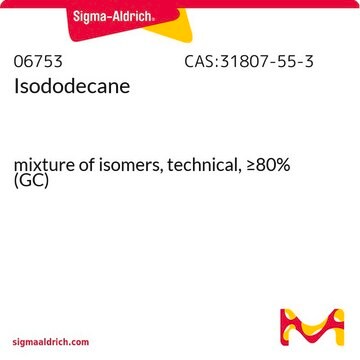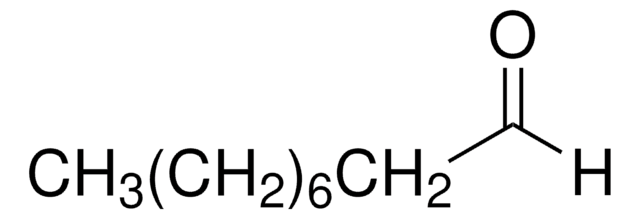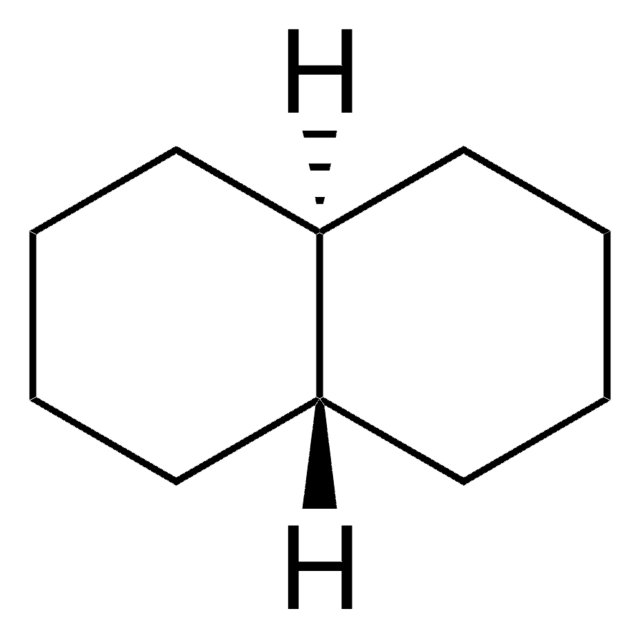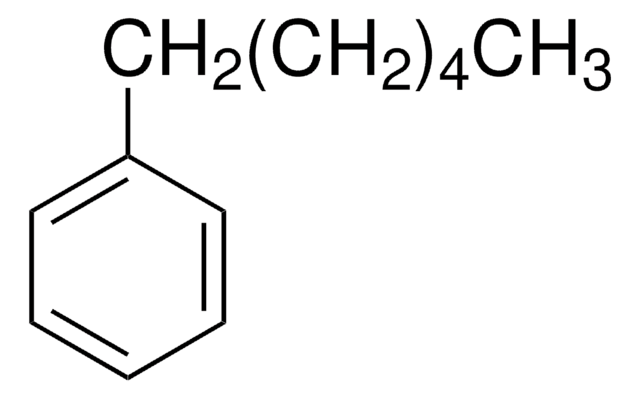128511
2,2,4,4,6,8,8-Heptamethylnonane
98%
Synonym(s):
HMN
Sign Into View Organizational & Contract Pricing
All Photos(1)
About This Item
Linear Formula:
(CH3)3CCH2CH(CH3)CH2C(CH3)2CH2C(CH3)3
CAS Number:
Molecular Weight:
226.44
EC Number:
MDL number:
UNSPSC Code:
12352100
PubChem Substance ID:
NACRES:
NA.22
Recommended Products
vapor density
7.9 (vs air)
Quality Level
vapor pressure
<1 mmHg ( 20 °C)
assay
98%
form
liquid
refractive index
n20/D 1.439 (lit.)
bp
240 °C (lit.)
density
0.793 g/mL at 25 °C (lit.)
SMILES string
CC(CC(C)(C)C)CC(C)(C)CC(C)(C)C
InChI
1S/C16H34/c1-13(10-14(2,3)4)11-16(8,9)12-15(5,6)7/h13H,10-12H2,1-9H3
InChI key
VCLJODPNBNEBKW-UHFFFAOYSA-N
Looking for similar products? Visit Product Comparison Guide
Related Categories
Application
2,2,4,4,6,8,8-Heptamethylnonane was used to study the effects of loading and aging pyrene in soils. It was also used to study its long term effect on the cell surface hydrophobicity (CSH) of a hexane-degrading Pseudomonas aeruginosa strain and a toluene-degrading Pseudomonas putida strain.
signalword
Danger
hcodes
Hazard Classifications
Asp. Tox. 1
supp_hazards
Storage Class
10 - Combustible liquids
wgk_germany
WGK 3
flash_point_f
215.6 °F - closed cup
flash_point_c
102 °C - closed cup
ppe
Eyeshields, Gloves
Choose from one of the most recent versions:
Already Own This Product?
Find documentation for the products that you have recently purchased in the Document Library.
Customers Also Viewed
Srikanth Mutnuri et al.
Applied microbiology and biotechnology, 67(4), 569-576 (2005-02-25)
Polycyclic aromatic hydrocarbons (PAHs) are worldwide environmental pollutants. Their bioavailability is limited by a low aqueous solubility, which causes specific adaptations in degrading bacteria. To compare bacterial degrading behavior, a study was conducted on the mineralization, metabolization and formation of
Somayeh Kazemzadeh et al.
Water science and technology : a journal of the International Association on Water Pollution Research, 82(10), 2134-2147 (2020-12-03)
This study aimed to find biosurfactant producing and crude oil-degrading bacteria able to decontaminate crude oil from wastewater. The bacteria that were isolated from contaminated sites in an oil refinery plant in Isfahan, Iran, were identified by 16S rDNA sequencing
María Hernández et al.
Applied microbiology and biotechnology, 89(5), 1573-1581 (2010-11-09)
The long-term influence of silicone oil 200 cSt (SO200) and 2, 2, 4, 4, 6, 8, 8-heptamethylnonane (HMN) on the cell surface hydrophobicity (CSH) of a hexane-degrading Pseudomonas aeruginosa strain and a toluene-degrading Pseudomonas putida strain was assessed in two-phase
Kathlyn M Kirkwood et al.
Biodegradation, 19(6), 785-794 (2008-02-27)
Mixed bacterial cultures aerobically transformed decalin (decahydronaphthalene) dissolved in an immiscible carrier phase (heptamethylnonane; HMN) in liquid medium. Conversion was enhanced in the presence of decane, a readily degraded n-alkane, and/or HMN. Four Rhodococcus spp. isolates purified from one of
J Harder et al.
Biodegradation, 11(1), 55-63 (2001-02-24)
Plant volatile organic compounds are a major carbon source in nature. We studied the degradability of these substances by anaerobic microorganisms in enrichment cultures with representative essential oils as organic substrates and nitrate as electron acceptor. Lemon and pine needle
Our team of scientists has experience in all areas of research including Life Science, Material Science, Chemical Synthesis, Chromatography, Analytical and many others.
Contact Technical Service














